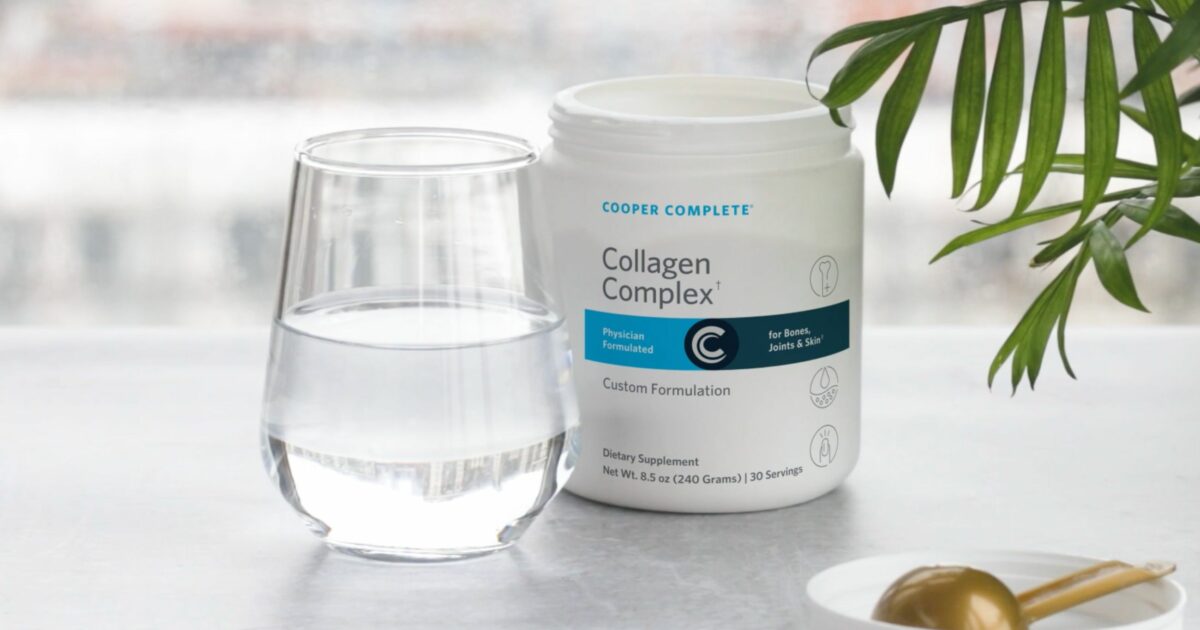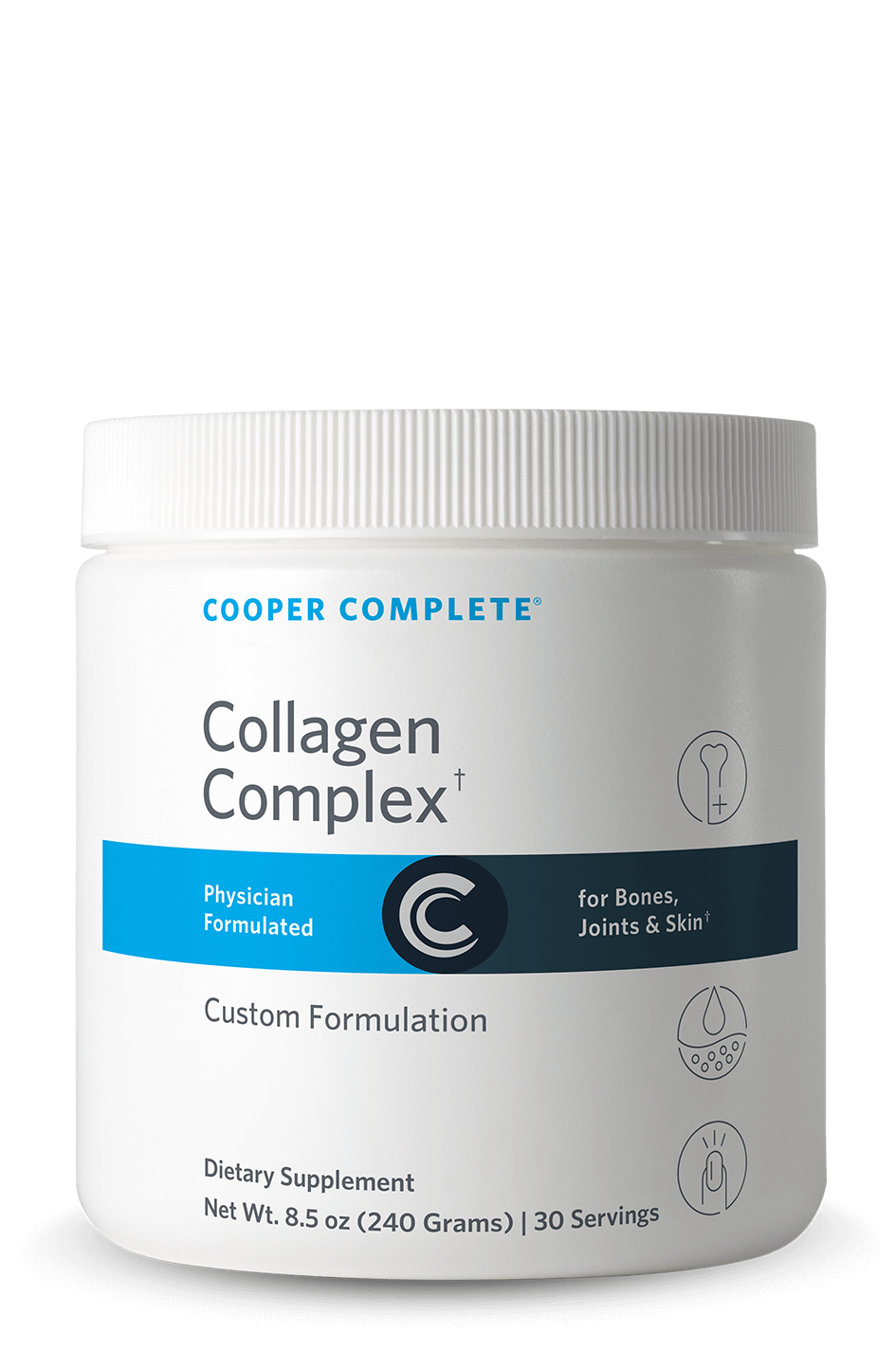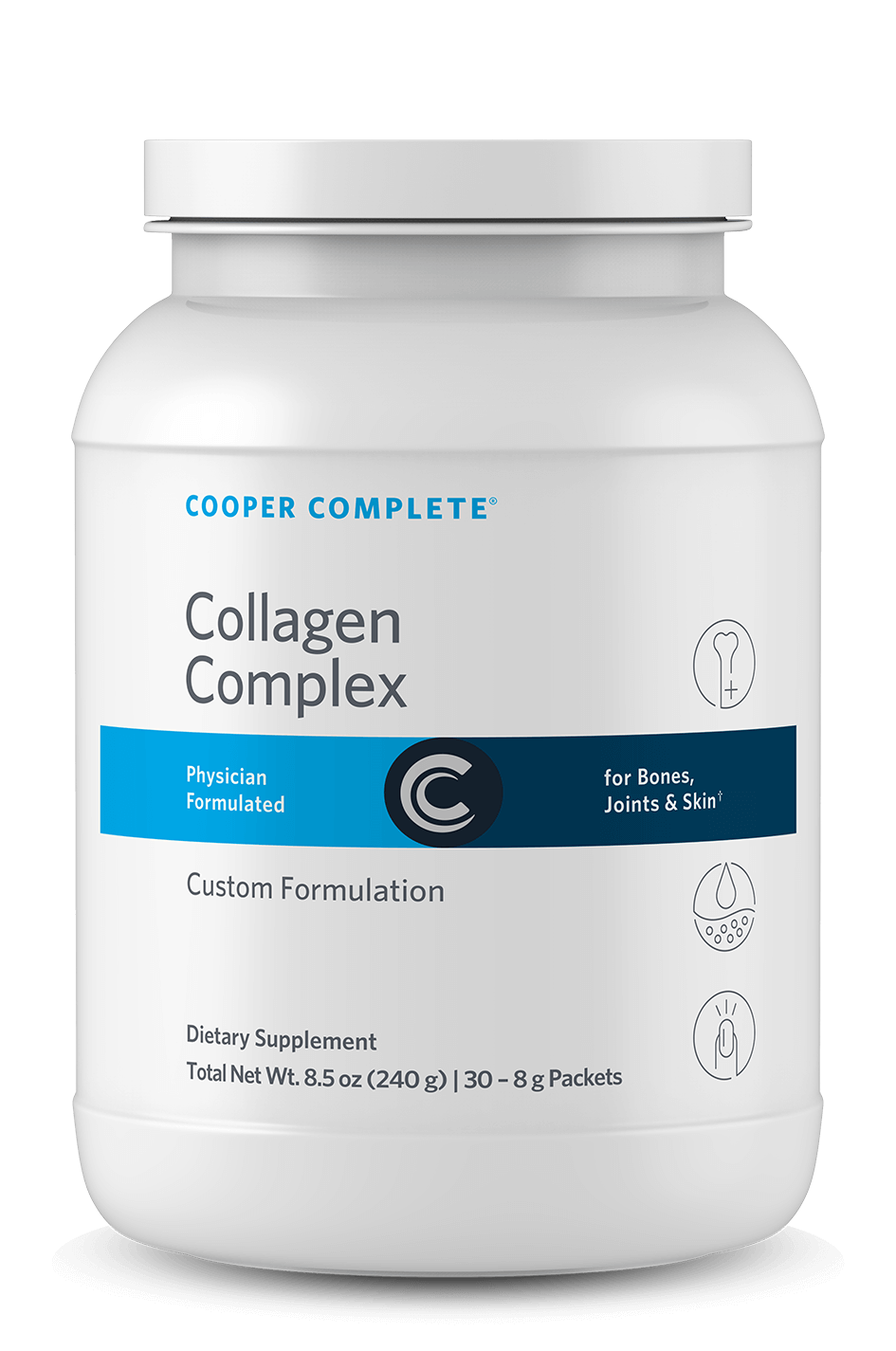Collagen Health Benefits

Collagen: Our Body’s Primary Building Block
What Does Collagen Do in the Body†?
Collagen is the most abundant protein in the body, accounting for about 30 percent of its total protein. Like scaffolding that holds the body together, collagen health benefits include being a key player in maintaining the structure and strength of our skin†, muscles†, bones† and connective tissues†. When the body lacks collagen, those parts lose their elasticity and strength, which affects their biological function.
Which Amino Acids Make Up Collagen?
The primary amino acids that make collagen are proline, hydroxyproline and glycine. When grouped together, they form protein fibrils in a triple helix structure, along with vitamin C, zinc, copper and manganese. This triple helix structure provides strength and stability to collagen fibers†.
Collagen in the Diet
Foods That Support Collagen Production
Following a “food first” approach to ensuring the body is getting enough of the nutrients it needs to stay healthy†, consume foods containing the amino acids that make up collagen. Proline amino acids are found in foods, including wheat, fish, egg whites, mushrooms, peanuts, cabbage and asparagus. Glycine amino acids are found in lean red meat, turkey, chicken and peanuts.
Does Eating Collagen-Rich Foods Increase Collagen Levels†?
Because the body can’t absorb collagen in its whole form—it breaks down collagen proteins into amino acids—eating collagen-rich foods doesn’t mean your body will have higher collagen levels. Bone broth, skin-on chicken and sardines are excellent sources of collagen†. To help the body synthesize collagen, combine those foods with citrus fruit or juices, peppers or other foods rich in vitamin C. Each serving of Cooper Complete Collagen Complex contains 100 mg of vitamin C to support collagen synthesis and absorption†.

Collagen Complex Supplement
Cooper Complete Collagen Complex Supplement contains three clinically studied and patented Type I and Type II collagen peptides, along with vitamin C, magnesium and hyaluronic acid, to support the natural healing process and maintain connective tissue structure. Unflavored premium collagen peptides allow ease of use and flexibility for your lifestyle.
$65.98 Add to cartSigns You May Need Collagen
Why Collagen Production Declines with Age
While the body produces collagen naturally, this production decreases with age. After age 30, natural collagen production slows by up to 1 percent each year. Sun exposure, smoking, lack of sleep, too much alcohol, sugar, refined carbohydrates and a sedentary lifestyle all contribute to a decline in collagen.
Common Signs of Collagen Loss
There isn’t a test available to determine whether your body needs more collagen, but there are signs and symptoms that collagen levels may have declined, including:
- Wrinkled, sagging or crepey skin
- Muscle aches
- Stiffness and reduced flexibility
- Slower post-exercise recovery
- Joint stiffness or discomfort due to age-related cartilage changes†
- Decreased mobility from joint damage or stiffness†
- Problems with blood flow
- Increased gastrointestinal issues
Collagen Supplements
What Are Collagen Peptides or Hydrolyzed Collagen?
Oral collagen supplements are available in pill and powder forms and typically contain two or three amino acids, marketed as collagen peptides or hydrolyzed collagen. Terms like collagen peptides or hydrolyzed collagen refer to broken-down forms of animal collagen that are more easily absorbed. “Fully” hydrolyzed collagen is the smallest form of collagen peptide and is soluble in both hot and cold fluids. (Collagen that’s not fully hydrolyzed will not easily dissolve in cold liquids.)
Types of Collagen and Their Roles
Each with at least one triple helix structure, the 28 distinct types of collagen vary in how the molecules are assembled, cell components added and where or how they’re used in the body. The three most common collagen types are:
Type I Collagen: Skin, Bones, and Tendons†
The most common type of collagen, Type I, is densely packed and forms the structures of skin, nails, bones, tendons, and ligaments. It helps skin look plump, elastic and youthful, making Type I collagen supplements suitable for skin health support†.
Type II Collagen: Joints and Cartilage†
One of the primary connective tissues in the body, providing flexibility while supporting bone health†, Type II collagen is found in cartilage on many joint surfaces, as well as in the ribs, nose, larynx and trachea.
Type III Collagen: Muscles, Arteries, and Organ†
Also used for skin health support, Type III collagen is found in muscles, arteries, and organs, and is a major structural component in large blood vessels, the bowel, and the uterus. Type III collagen works in conjunction with Type I in skin ligaments to support skin health and elasticity†.
Collagen Ingredients: Why Brands Matter
What Are Branded Collagen Ingredients?
When researching collagen supplements, you may notice many include ingredients with specific, third-party brand names. A key benefit of these branded ingredients is that they require clinically supported research to back their health benefit claims. Cooper Complete Collagen Complex contains the following branded ingredients:
What is Tendaxion™ Used For†
Tendaxion™ is a combination of Type I hydrolyzed collagen and mucopolysaccharides, studied for its role in supporting tendon health† in adults experiencing discomfort† with tennis, golfer’s or baseball elbow, rotator cuff tendonitis, or trigger finger or thumb pain†. Acting much like rubber bands, tendons are elastic bands of tissue that connect muscles to bone and joints, causing pain and discomfort when inflamed and swollen†.
In a 90-day period, participants who took Tendaxion experienced an 81 percent reduction in discomfort†. The authors noted that while discomfort was significantly reduced during the first month of supplementation†, it took 90 days to reach the 81 percent reduction†. Cooper Complete Collagen Complex supplement contains 520 mg of Tendaxion in each 8-gram (1 scoop) serving, the same amount used in the study. (This supplement is available in a canister, as well as in on-the-go stick packets.)

Collagen Complex Collagen Packets Supplement
Cooper Complete Collagen Complex Collagen Packets make it easy to care for your skin, joints, and overall wellness. Each convenient, single-serve stick packet delivers a blend of premium, unflavored collagen peptides (Type I & II), along with vitamin C, magnesium, and hyaluronic acid. Clinically studied ingredients support your body’s natural repair processes†—just mix and go, no hassle required.
$68.98 Add to cartFortigel® for Joint Comfort and Cartilage Support†
Fortigel® is a patented gelatin hydrolysate (Type II collagen) shown in clinical studies to support cartilage cell activity and joint comfort† and make joints smoother and more mobile†. Fortigel accumulates in cartilage after being absorbed in the intestines†.
A 12-week randomized controlled trial of 180 adults ages 18-30 with exercise-related knee pain not associated with a diagnosed joint disease found significant reductions in joint pain from exercise† after daily supplementation with 5 grams of Fortigel (bioactive collagen peptides)†.
A 48-week randomized controlled trial examined whether magnetic resonance imaging (MRI) or T2 mapping could detect short-term changes in knee hyaline cartilage among adults taking Fortigel. Captured at baseline, 24 and 48 weeks, knee joint images showed significant improvements as early as 24 weeks among the group taking Fortigel vs. placebo†.
Mobilee® for Joint Lubrication and Muscle Strength†
Mobilee® is a patented hyaluronic acid matrix containing polysaccharides and collagen extracted from rooster comb that helps reduce friction between cartilage† and acts to lubricate the joints†. Although hyaluronic acid is naturally produced in the body, the quality and quantity of this substance decrease with age. Mobilee targets joint and muscle health by boosting natural hyaluronic acid production 10-fold, enhancing muscle cell proliferation to support muscle strength† and reducing inflammatory mediators in joints†.
How Collagen Supports Skin Structure and Hydration†
Collagen’s Role in Skin Elasticity and Hydration†
Collagen strengthens skin†, improves its elasticity† and boosts hydration† to moderately reduce the appearance of wrinkles†. Acting as a sponge, hyaluronic acid pulls in and binds with water to quench and plump the skin† and firm the complexion†, while also supporting well-lubricated joints†. Collagen supplements designed for skin health typically contain Type I and/or Type III collagen†.
Clinical Study on Collagen and Skin Elasticity†
In an eight-week study of 69 adult women aged 35-55, those who received daily collagen supplements had improved skin elasticity compared to those taking a placebo after four weeks†. And after eight weeks, the older women in the group were found to have higher skin elasticity†.
Collagen’s Role in Bone Support and Density†
Research on Collagen and Bone Mineral Density†
In a year-long randomized controlled study, 131 postmenopausal women in their mid-sixties with reduced bone mineral density were given 5 grams of collagen peptides, applied to the femoral neck and spine. Researchers saw statistically significant increases in bone mineral density of 3 percent and 6.7 percent in the spine and femoral neck, respectively†. In a four-year follow-up study, none of the 23 women examined experienced a fracture during the time period†. And, while declines in bone mineral density was expected for women of that age, researchers saw a surprising improvement of about 7 percent†.
Collagen May Also Support Healthier Hair†
How Collagen Supports Hair Structure†
The body needs collagen to produce keratin, the protein that makes hair grow†. Proline, one of the three components of collagen, is the primary component of keratin. Collagen is also the primary component (70 percent) of the dermis, the connective tissue layer containing hair follicles. While human studies are needed to substantiate this health benefit, collagen’s role in producing hair growth suggests it may play an important role in supporting its health†.
Tips for Effective Collagen Supplementation
How Long Does It Take for Collagen Supplements to Work?†
Most research indicates that collagen supplements must be taken daily and consistently for two to six months to achieve noticeable results. While more research is needed to better support the health benefits of collagen supplements†, studies have shown an increase in mobility† and reduction in joint† and muscle stiffness† with as little as three weeks of supplementation†. The best results, however, are seen after three months of consistent daily use.
How to Take Collagen Supplements for Best Results†
While collagen supplements don’t need to be taken with food to be absorbed, when taken in powder form, mixing them with food or beverages is common. Collagen powder can be mixed into hot or cold beverages, as well as food. It’s even safe to incorporate into baked goods without diminishing the health benefits†.
It’s always important to consult your physician before adding any new supplement to your routine, especially if you have chronic conditions or are on multiple medications. Your physician understands your health profile best, so talk with them about which supplements are best for you and your medical condition.
